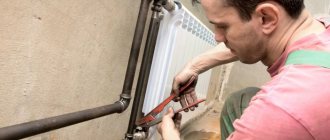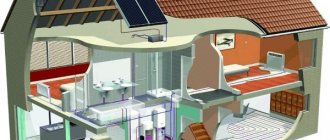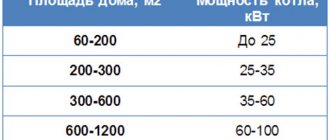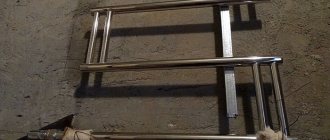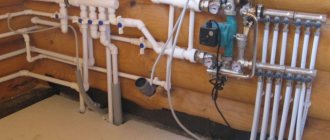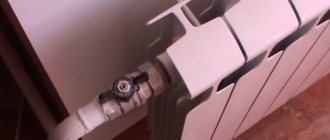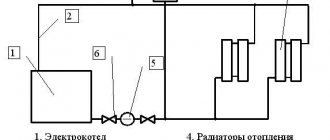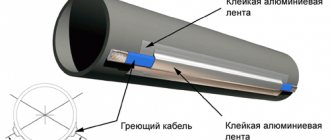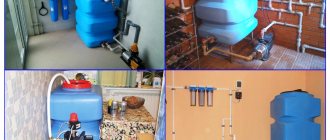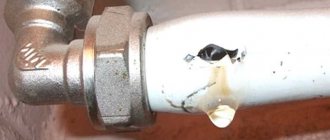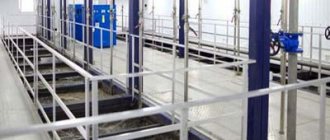A phenomenon such as knocking in heating pipes can actually manifest itself in different ways. It could be, strictly speaking, a knock, or it could also be crackling, seething, or clicking. In any case, the consequences of knocking can be much more serious than the effect on the nerves. If you do not take proper measures in time to eliminate the knocking, you can end up with a very serious emergency situation.
But, before you start eliminating extraneous sounds, you need to determine what kind they are. It is based on the nature of the noise that it is necessary to look for a way out.
How to solve noise problems
It often happens that the heating device becomes clogged from the inside.
In this case, pieces of slag will move along the radiator along with the flow of water, touching the walls. In this case, flushing will help. A hose is put on the faucet, and the water along with the debris is gradually drained.
Video:
If the procedure does not help, at the end of the heating season the radiator will have to be dismantled, disassembled and cleaned, or replaced.
An air lock in a heating device is a common cause of unpleasant gurgling sounds.
This problem is solved with the help of a Mayevsky crane, which will allow the air to be released and the battery to continue to operate silently.
Quite often, at the beginning of the heating season, problems with noise in pipes can arise due to pressure that is not fully equalized.
When the pressure difference in the pipeline exceeds 1.5 atmospheres, tapping may begin.
In this case, the specialist must install a washer in front of the regulator nozzle, which will equalize the pressure.
In an apartment building, a circulation pump is responsible for the movement of warm water through pipes and heating appliances in apartments.
If for some reason it starts to work incorrectly, then specialists must determine the solution: it may be necessary to install a special valve that will correct the operation of the pump, or it may even go as far as replacing the unit.
If the cause of the noise is identified in the place where the heating battery connects to the bracket, then you should think about replacing the brackets or choose a simpler method - place a rubber pad between the battery and the fastening element to prevent friction.
You can identify the leak yourself. To do this, just inspect the pipes in your apartment or house. If one can be seen with the naked eye, then this is good luck, and corrective measures can be taken immediately.
Having found out that everything is normal in the apartment, you need to go around the neighbors to look for the pipe from which water is leaking.
Video:
If your neighbors also do not find a leaking pipe, then it is necessary to inspect the main unit of the heating system.
In an apartment building, it is located in the basement, going down into which you can immediately come across steam - it is this that signals the location of the breakthrough.
In this case, the emergency service is immediately called.
As it turned out, there are various reasons for the unpleasant sounds emanating from radiators. But it will be easier to find out the reason now.
In most cases, it is better to solve the problem of eliminating noise according to the opinion of specialists, because they are guaranteed to have experience, knowledge, special tools and spare parts.
The main thing is not to hesitate, because this will help to avoid emergency situations in the future.
Heating pump malfunction
If the radiator and pipes are working properly, and the cause of the problem is related to the pump, it should be diagnosed. Most often, noise is caused by a faulty rotor or impeller. The entire heating system suffers from this and its efficiency begins to drop. Repair or complete replacement of parts can solve the problem.
The noise from the circulation pump is sometimes caused by external reasons, for example, a voltage drop. As a result, imbalance occurs, synchronization is disrupted and the coolant begins to move unevenly. This causes noise to be heard both in the radiators and in the pipes. The diagnosis must be carried out by a specialist.
But in some cases, even during stable operation of the pump, noise and vibration occur, then you need to check:
- whether the equipment power corresponds to the initial calculation results. If not, then the coolant moves through the pipes either too slowly or too quickly and creates different types of noise;
- correct installation. First of all, you need to check the location of the rotor of the device. It must be in a strictly horizontal position.
What types of noise can pipelines make?
The sounds emanating from heating system elements are legendary. Under certain circumstances, not only heating pipes make noise in the house, but also other pipelines. At the same time, the sound range of all sanitary systems is approximately the same. The most “musical” ones are metal pipes, but they also play unusual melodies. A water heating system can make a wide variety of sounds:
- murmur;
- gurgling;
- rattling;
- knock;
- crack;
- clicks;
- hum;
- whistling;
- howl.
Specific sounds signal the presence of problems in the heating system, so it is necessary to quickly identify and eliminate the source of the noise, since systematic exposure to it on a person leads to disorders of the nervous system, interferes with sleep and reduces performance. Why is water noisy in heating pipes
Noise in heating pipes is caused by the following reasons:
- air jams;
- high speed of coolant movement due to incorrectly selected pipeline diameter or a decrease in the internal lumen of the pipe due to overgrowing of its walls;
- coolant leakage in emergency areas or through poorly closed valves;
- scale peeled off from the pipe walls or debris that got into the circuit during installation;
- faulty or incorrectly installed valves;
- excessive pump power or improper installation;
- wear of control valves or thermostatic heads;
- cavitation - the formation of steam bubbles in the coolant in the area of a sharp increase in the diameter of the pipeline (the appearance of an area of low pressure) with their subsequent collapse, destroying the equipment;
- violations of installation technology (use of polypropylene pipes with a diameter smaller than the calculated one, failure to observe the minimum distance between parallel sections of a metal pipeline during installation, installation of a filter or valve not in the flow direction indicated on it, etc.).
Methods for neutralizing noise
The source of noise often turns out to be in the locations of public utilities. The coolant pressure at the heating main entry point is the highest, so the slightest malfunction in it can immediately manifest itself in the form of strange sounds throughout the entire entrance. In a private house, the noisiest place is the furnace or heat generator room, where the boiler and its entire piping system are located.
If the problem turns out to be a malfunction of collectively owned equipment, then you should not fix it yourself. Worn-out components can literally crumble at the slightest attempt to unwind them, and all the blame will be placed on the one who unauthorizedly interfered with the operation of the “perfectly debugged” system. It is better to send a complaint to the service organization and patiently wait for their representative to repair the faulty components.
A visual reminder with the coordinates of addressees if it is necessary to contact housing and communal services issues
And the neighbors are noisy too
More often than not, it's not just you and your family who suffer this. Therefore, you first need to go around the neighbors along the riser to identify the location of the noise.
Now, as for the nature of the buzz. Heating pipes, like water pipes, can emit single or rhythmic sounds, something like tap dancing, rustling, gurgling, or even generally vibrate and even hum – periodically or constantly. The reasons can be completely different, they are even classified into groups. But now we will not consider absolutely all of them, but will focus only on impact noise effects.
Note: The likelihood of noise in pipes is sharply reduced if you use metal-plastic or plastic pipes instead of metal and copper. This is explained by the high sensitivity of steel pipes to low-frequency vibrations and high rigidity. Although their material is much stronger. It is recommended to use ball valves rather than screw valves as shut-off valves, which are controlled by turning the handle. These are heavy cast copper products, not Chinese-made products made from light alloy material.
Why does “humming” occur in the water supply system?
We will consider the reason based on physical knowledge. The main reason is sound waves due to vibration. Its cause may be:
Very high pressure in the pipeline
The sound will be heard not only by the entire entrance, but also by the house. The pipeline may have been damaged in a hard-to-reach place. The result can be costly repairs for you and your neighbors.
Metal pipeline wear
The faucet hums when the tap is turned off due to the accumulation of lime and other deposits on the walls of the pipes, as well as rust. This can also be the cause of vibration and humming when the water is turned on.
Incorrect pipe connection during installation
A common cause of unpleasant sound. Therefore, if the water tap is humming, it is necessary to check all connections between pipes and system elements.
The most obvious problem, due to which the faucet not only begins to “buzz”, but also leaks in addition.
We find out and eliminate the defect
Before installing a water supply system, we recommend that you make the correct calculation of the diameter and material of the pipes, in accordance with the pressure in it. When installing gaskets in a faucet, you need to choose only high-quality materials from reliable companies. The installation of the system should be carried out professionally and efficiently.
Alas, this does not happen as often as we would like, so you will have to make your own adjustments as the operation progresses:
- A radical solution to the problem - replacing all the old pipes in the apartment with new ones - may not bring the desired result. This is due to the fact that it is necessary to change the entire pipeline in the entrance or house.
- A less radical way to deal with a humming faucet is to clean the pipes from accumulated deposits. The method is definitely effective, but you will have to clean the pipes periodically.
Tip: to determine excessive water pressure in the system, you need to open the mixer and then close it immediately. If after the tap is closed you hear a hum, then this is the reason.
The faster the sound appears, the higher the pressure in the pipe, and the volume indicates that the permissible limit has been exceeded. In this case, we recommend installing a special air chamber in front of the mixer to absorb sudden pressure surges in the system.
Air chamber for noise reduction
Installation can be carried out using:
- additional pipe section;
- special muffler for the crane. The devices are manufactured industrially and are equipped with a built-in chamber to suppress sudden pressure drops.
If vibration and humming occurs due to loose installation of system elements, seal them with improvised means. As a result, the various turbulence in the flowing water will disappear, and the mixer will stop humming.
Pipes hum when the tap is opened - check the tap axle box
Faucet repair
Now let's talk about the main reason for the “buzzing” of the mixer - the faucet-axle gasket, which may be incorrectly installed, defective or worn out. In the vast majority of cases, it is this that causes the sounds in the system when the tap is opened and its leakage.
Let's look at the problem in more detail:
- Determine which tap produces an unpleasant sound when you open it, hot or cold.
- Shut off the corresponding supply with your own hands.
- Dismantle the crane axle box on which the gaskets we need are located. The faucet is a device necessary for regulating the water supply. Usually located under the valve.
In the photo - replacing the gasket
- Replace worn gaskets, their price is very low, so choose the best ones. Rubber or ceramic products can be used. To find out which ones you have installed without disassembling the faucet, open it. If you need to make one revolution, a ceramic gasket is installed, several - a rubber one.
Repairing a faucet with a rubber gasket
- Remove the crane axle box.
- Take a sharp knife and cut the edge of the gasket at approximately a 45˚ angle.
Tip: keep in mind that the cutting depth should be no more than 1 mm.
- If you see that the gasket has already worn out completely, then it is better to replace it immediately.
- Reassemble the faucet after all manipulations with the gasket.
- Turn on the water and check the device for leaks and humming.
If you don’t know what to do if your hot water tap is humming, disassemble the device and check its parts
Advice: The most likely cause of leakage and “humming” of a faucet with an installed ceramic-based faucet axle is a sagging silicone washer, which is needed to press the ceramic parts of the element together.
We recommend covering the silicone ring with plastic after disassembly. Usually the problem of leakage and unpleasant sounds is eliminated.
The gasket is worn out - that's why the faucet is humming
The measures suggested above are temporary. Therefore, you need to rush to the store and replace the failed crane axle box.
Sounds from heating devices
If you hear a howl in the middle of the night, then most likely the system has leaked. A cloud of steam and a characteristic whistle will immediately indicate a gust or a failed valve. In some cases, it is enough to close the tap to bring the heating system into working condition.
If no obvious causes are found, and the howling is accompanied by a crackling sound, it is necessary to check the pressure. Perhaps the flying scale blocked the free flow of the coolant, which caused increased pressure - it is urgent to stop the boiler, drain the water and look for the problem.
It happens that the batteries start to “shoot” - this is another reason to be wary. Such noise is typical for bimetallic batteries when the pressure in the system does not coincide with the calculated one.
When purchasing heating appliances, you need to take into account the operating parameters of the boiler and select the appropriate radiators. Otherwise, the problem may result in a rupture of the heating device due to water hammer, which is completely inappropriate in the winter cold.
Heated water is not able to compress; it needs to move freely along the contour. Banal deposits in pipes can provoke an increase in pressure and rupture of pipes due to water hammer.
Another reason is an air lock, which can be eliminated through the Mayevsky drain valves located at the ends of the batteries. The procedure is simple, and anyone can handle it.
Noise Elimination Solutions
A set of simple measures will help you get rid of some sounds. There is no need to invest serious financial resources or physical effort. The choice of method for eliminating noise depends on its nature. The symptoms described will help solve the problem and get rid of annoying sounds of any origin.
Noise in heating pipes
The dull monotonous noise of the riser is accompanied by slight vibration in the batteries. The cause of the problem is a simple water leak. The damaged area can be detected visually or by ear. A vapor cloud forms at the leakage points and a slight hissing or hissing sound is heard. The cause of the leak may be an insufficiently closed air release valve. Often damaged areas are hidden under a layer of insulation or in the space of concrete floors. It is difficult to detect them in such cases. Basement leaks create noise throughout your home.
Another reason for a hum is clogged pipes. Over time, a layer of scale and rust forms on the internal walls. The diameter of the elements decreases and the pressure increases. As a result, noise is generated in the heating radiators. You can flush the system yourself; you should take care of this before the start of the heating season. A flush tap is installed on the radiators, through which (using a hose) hot water is drained into the toilet. The procedure is performed until clear liquid flows from the hose. Sometimes such actions are enough to stop the hum, clicking and crackling.
Attention! When draining boiling water from heating, you need to take precautions. Water above 90°C can cause harm to health and crack ceramics
The described method will help to partially get rid of garbage. Hydropneumatic heating flushing or the use of chemical reagents will help return the pipes to their original properties.
The reason for the hum is the taps responsible for regulating the flow of heating fluid. Shut-off equipment is installed directly in front of the radiators or at other points preceding the radiators. Excessive blockage of water flow obstructs normal circulation. Under pressure, the heating fluid hums, whistles, etc. Correct adjustment of the taps will help prevent this phenomenon.
Wear and wear of internal parts of shut-off equipment leads to vibration. Resonance of parts creates an unpleasant hum. The solution to the problem is to repair or replace the taps. The elevator unit of the heating system, which is located in the basement, is noisy as a result of unprofessional intervention. To increase the amount of coolant, residents themselves remove the washer, which is responsible for the speed of water flow.
Insulation for radiators is rarely used in Russia
Knocking in boilers and pumps
Boiler equipment used to equip heating systems can operate on various types of gaseous, liquid or solid fuel, or also on electricity. However, the operation of boilers of any type may be accompanied by certain side processes, which often affect the heating system and can cause noise in it.
In particular, wood or coal solid fuel can lead to clogging of the chimney with a decrease in draft force. The operation of boiler houses using liquid diesel fuel may be accompanied by incomplete combustion and accumulation of soot. All this often leads to noise and humming in heating communications, and requires measures to eliminate these problems.
Noise may also appear due to malfunctions of pumps, valves or other devices and mechanisms located in the boiler room or basement. The solution to the problem in such situations is to repair faulty elements or replace them.
In general, any specific situation with the occurrence of noise in the heating system requires an individual approach, and there cannot be universal methods here. In some cases, identifying and eliminating faults on your own can be very difficult, and in this situation, the only way out of the situation is to contact qualified specialists.
Noises in the water supply
Even slight noises from the plumbing and heating system echo throughout the floors. The stretched “string” of the pipe causes this effect. When looking for the reason why the pipes in the bathroom are noisy, the riser from the top floor to the basement is checked. Neighbors who also suffer from extraneous sounds will help cope with the task of finding the source.
Monotonous hum
Leak causes whistling and gurgling noises
Hum and whistle occur due to a leak in the airtightness or decreased permeability. Both cases lead to an accident if you hesitate to eliminate it. The whistle intensifies as you approach the source of the sound, so the location of the breakthrough is sought by methodically checking the riser. Heating pipes will reveal the leak point as a cloud of steam. On cold water pipes, the seams and fittings are checked first. Dampness of objects nearby is the basis for checking: a micron defect in the seam under pressure will become the site of a breakthrough. A hum and evidence of increased pressure within the system. If it is not associated with an increase in supply power, the reason is a decrease in the internal diameter of the pipe. Lime deposits on metal communications create such a layer within 5–7 years of operation. A “singing” boner needs urgent diagnosis. It’s worth starting with a survey of residents: if the hum appeared after repairs among neighbors, the possible root of the problem is the incorrectly selected diameter of components or fittings. Replacing the adapters with larger diameter ones or turning the plugs will eliminate the noise. The riser, “singing” from old age, needs a complete replacement.
Crackling and knocking
Pipes in contact knock when oscillating
This behavior is typical of old metal heating pipes. This happens for one of three reasons:
- A foreign body has entered the coolant and is carried through the system in streams of water. Touching the walls causes a quiet but annoying knock. The problem gradually eliminates itself, unless crumbs of lime deposits in the pipes act as a foreign body. In the latter case, the issue can only be resolved by replacing the old riser.
- If you are looking for an answer to the question why the water is noisy in the heating pipes, check the valves and taps. If they are worn out, with damaged valves, it is better to replace them. Erosion occurs due to the opposite direction of flow to the fittings and exceeding the recommended service life. If the problem is ignored, the same defect leads to incomplete blocking of the flow and an increase in pressure. A breakthrough is possible.
Regular noise coming from the same side in water supply pipes indicates the location of the defect. The technician will check the valves and make sure that they are installed without violating the installation technique. Worn components are replaced.
- One of the common reasons why heating pipes make noise is the reaction of the metal to cooling and heating. Temperature changes cause the walls to expand by 2–4 millimeters, but this is enough for the pipe, tightly pressed to another surface or bracket, to tap when oscillating. When the bracket is tightly fastened, groaning notes appear for the same reason: creaking and grinding causes friction of the materials. You need to look for the cause in the source of cold air that changes the temperature of the heating main. At the entrance it is an open or poorly insulated window, at home it is a window or an entrance balcony group. In the first case, the problem will be solved by insulating the window during the cold season. The issue of conflict between fresh air and battery-heated air is more difficult to resolve. Shock-absorbing pads will eliminate noise, but will not reduce the load on the pipe. The wear of a constantly deforming unit increases many times over. A complete solution to the problem is only redevelopment.
Gurgling
Gurgling sounds are a sign of a foreign body in the carrier. Heating pipes also make noise due to air bubbles. The first problem cannot be solved on our own; the second can be eliminated by bleeding the air. You need to carry out the procedure both in your apartment and with your neighbors: round pipes spread sounds far, and the cause of noise on one floor may be two or three floors above or below. You can determine the location of air accumulation by palpation: the temperature contrast will show the area of congestion. First of all, radiators and connections to them are checked. These areas cause air to accumulate.
The risers are humming
Most often, residents of apartment buildings complain about a uniform hum or whistle. So why are heating pipes humming?
There are only two main reasons for such noise: a leak in the heating system or a narrowing that prevents circulation, through which a large volume of water passes with difficulty.
Leaks and working vents
Let's use the most reliable tool: logic. If there is a leak somewhere in the heating system a short distance from the apartment, it means that a large amount of hot water is flowing into one of the adjacent rooms.
It's quite difficult not to notice this. So, we have to raid our neighbors. Waterproofing the floors, alas, does not protect against leaks from the upper floors, so if the house has at least half of the neighbors on the riser, the search will not be long.
Heating riser fistula
However, let's assume that all neighbors have dry floors; however, the nerve-wracking whistling continues.
Well, let's take a flashlight and go to the basement.
If we are met by clouds of steam, the investigation can be considered complete: all that remains is to find the location of the leak and eliminate the leak, be it an open vent valve on the riser or a fistula in the drain pipe (horizontal heating distribution pipe).
The fistula, by the way, may well be hidden under thick thermal insulation: all we will see in this case is a stream of hot water running to the ground. Well, we remove the thermal insulation and look for a leak...
The place where water under pressure escapes into the atmosphere, by the way, does not necessarily have to be located near the apartment in which they complain about noise: sounds travel through pipes over a long distance.
Of course, in nearby rooms the noise is more audible, but do not forget that people react very differently to unfamiliar sounds: some will ignore them, while others will suffer night after night in fruitless attempts to sleep.
Don’t be too lazy to get to the elevator unit; it is quite possible that for some reason there is an open drain there, draining water from the heating system into the sewer.
The “reset” operation of the elevator unit is usually used only when starting the heating system for a very short period of time, however, a careless mechanic who has been plagued by complaints from residents about cold radiators may well, instead of agreeing with a higher organization through official channels, change the diameter of the elevator nozzle , simply allow the water to flow from the supply line directly into the drain.
Elevator unit
However, we went around the neighbors and examined the basement, but there are no leaks, but the noise continues. We are making the following attempt to understand why heating pipes make noise.
Reducing pipe patency
The next stage will be very difficult: you need to find the source of the noise by ear, simply walking past the pipes and listening to where it becomes stronger. Once we find its approximate location, we can understand what exactly happened.
In apartment buildings, the source of noise can primarily be elevator units and benches - places where the flow of water is fast enough for its deceleration at the narrowing to be acoustically detected.
In the heating riser, the narrowing will simply lead to a significantly lower battery temperature compared to its neighbors; The pressure difference between the supply and return (in the case of bottom filling) risers or between the top and bottom (in the case of a top filling heating system) of one riser is too small.
First of all, half-closed valves or valves with a damaged valve can hinder the flow of water (this, of course, applies to old screw valves); A piece of slag or scale standing somewhere across the pipe can also cause noise in the pipe.
If in the first case you can simply open the valve all the way or repair/replace it (of course, this will require at least a partial reset of the heating system), then in the second, in order for the heating pipes to be cleaned successfully, you may need the help of a welder, and in severe frosts and subsequent heating of frozen risers; in regions with a harsh climate, it is better to leave such work until spring.
However, sometimes it helps to stop the heating using any shut-off valve located along the water flow higher than the problem area, and to open any discharge immediately after the place where the water is shut off: the unfortunate pebble can easily be carried out in a counterflow.
A little advice that will be useful at the design stage of a heating scheme (for example, from polypropylene pipes) in any private or apartment building: when it comes to purchasing shut-off valves, forget about the existence of screw valves and small-diameter gate valves. At all. Modern ball valves, which shut off the water by turning the handle ninety degrees, are incredibly more practical, more convenient and create far fewer problems during operation.
Among other things, they do not have those same narrowings under the valve, where, as a rule, ALL debris flying through the pipes collects, sooner or later blocking the flow of water, regardless of the position of the valve. In addition, for a ball valve it does not matter how it is oriented relative to the water flow: you can forget about the problem of the valve coming off in case of incorrect installation.
Riser with ball valves
Not a very typical example, but it is probably better to mention it as part of the exchange of experience. In the author’s practice, there was a case when the residents of the entrance began to complain: the heating pipes were noisy.
The reason for the continuous noise in the heating riser was the residents' continuous cleaning of the radiator for several days. They sincerely believed that they would be warmer this way. If a materialized antonym for the word “economy” is possible, then the owner of this apartment seriously lays claim to its role.
It’s worth making one more lyrical digression. The above statement that a noise source cannot be located inside the heating riser applies exclusively to apartment buildings with permanent heating distribution.
Where there is a so-called barracks wiring - where all the batteries on the floor are combined into a ring, and even made from a great mind in the wrong way - when the batteries are cut parallel to the main pipe, but in such a way that each battery breaks the ring - any piece of slag on at the entrance to the radiator or at any other narrowing, it can sing a love song to the owners day and night.
Note!
In the case of private houses, the layout of heating devices, which implies the possibility of disrupting the ENTIRE flow of water in the heating system with one interruption, is aggravated by the fact that private boilers are often equipped with a circulation pump that creates a FAST flow of water. At any narrowing it will make quite noticeable noise.
Why do you hear clicking, crackling and knocking noises?
The appearance of clicking or crackling noises in the heating system pipes usually indicates that foreign solid particles have appeared inside the communications. The impact of such small particles on the pipe walls is the direct cause of such noise.
As a rule, heating pipes knock and click when the following problems occur:
- wear of some key elements of the system;
- valve valve malfunctions;
- expansion of metal heating pipes under the influence of heat.
In most cases, knocking in the heating pipes of a private house or apartment building can be eliminated by simply draining the clogged water from the heating system and replacing it with clean water. If such flushing does not eliminate noise, then the faulty parts of the system must be replaced. In particular, valve valves are subject to inspection, problems with which are often the cause of such noise.
Another reason for knocking in heating pipes may be the thermal expansion of metal pipeline structures. Usually in this case, the crackling and knocking noises are quiet and intermittent. The expansion of pipes can lead to slight movements and disruption of the fastening of some structural elements, which leads to noise of this kind. To solve this problem, it is necessary to inspect the places where various parts and elements are fixed, and, if necessary, re-fasten them.
Finally, another reason that can lead to clicking and knocking in heating pipes is the so-called water hammer. It occurs when the water circulating in the pipes is instantly shut off by closing the valve, valve or tap. Since the compressibility of water is practically zero, and stopping the water stream cannot happen immediately, for a short time, at the point where the tap is suddenly closed, the pressure can jump by tens of atmospheres. This can lead to malfunctions of valves, valves, threaded connections with clicking or crackling sounds, and even failure of some parts. Therefore, to avoid this, you should not suddenly shut off the flow of liquid circulating in the heating system.
What causes knocking in the heating system?
Knocking in the heating pipes of a private home is a common occurrence for owners with individual heating. Why the noise occurs and what influences it is necessary to understand.
The main indicator of trouble is poor-quality coolant containing dissolved salts and mechanical impurities.
Causes of noise
There are actually not so many reasons for knocking in heating pipes when heating. Some noise can be ignored - it does not harm the system or heating devices. But noises such as buzzing, crackling, knocking, gurgling, and howling should give reason to think and take urgent action.
Common reasons:
- air pockets in the system;
- clogging or overgrowing of pipes due to poor-quality coolant;
- leaks in the pipeline;
- violation of installation work when installing taps, valves and laying pipes;
- failure or wear of working equipment;
- cavitation, an increase in pressure in places where the diameter of pipes increases (decreases);
- incorrect calculation or non-compliance with design recommendations when installing the heating system.
These circumstances arise in private closed-loop systems and make us think about their urgent elimination.
The circulation pump in the heating circuit system promotes forced movement of water, which leads to uniform heating and displacement of accumulated air from the system.
If the heating in a house or apartment is connected to a central pipeline, then startup, accompanied by similar sounds, is normal. Water, filling the general system, pushes out air, and, flowing along the contour, is accompanied by gurgling, knocking and crackling sounds.
As soon as the equipment enters operating mode, the general adjustment of the system will end - the temperature of the batteries will increase, and everything will stop. This is clearly visible in the diagram of heat supply to consumers from the central boiler house.
Types of noise in pipes
The noises that accompany the general heating start-up differ from emergency ones - they are intermittent and are accompanied by gurgling or gurgling. In bimetallic or aluminum batteries, a crackling or buzzing noise may be heard - this is also normal.
It is clear that prolonged noise is unpleasant, so it is necessary to prevent the situation in a timely manner.
The knocking and hum that occurs in the room with increasing force give reason to be wary and take drastic measures:
- Check heating devices and temperature conditions in the circuit. If a pump is installed, then its operation.
- Pay attention to the valves - if they break, a characteristic whistle appears. Sometimes a small adjustment is all it takes to get the equipment working.
- Having discovered visible problems, you need to stop the coolant and turn off the heating devices. Having assessed the breakdown, proceed to eliminate the accident yourself or invite a specialist.
These are primary measures that can prevent the development of major destruction.
Sounds from heating devices
If you hear a howl in the middle of the night, then most likely the system has leaked. A cloud of steam and a characteristic whistle will immediately indicate a gust or a failed valve. In some cases, it is enough to close the tap to bring the heating system into working condition.
If no obvious causes are found, and the howling is accompanied by a crackling sound, it is necessary to check the pressure. Perhaps the flying scale blocked the free flow of the coolant, which caused increased pressure - it is urgent to stop the boiler, drain the water and look for the problem.
It happens that the batteries start to “shoot” - this is another reason to be wary. Such noise is typical for bimetallic batteries when the pressure in the system does not coincide with the calculated one.
When purchasing heating appliances, you need to take into account the operating parameters of the boiler and select the appropriate radiators. Otherwise, the problem may result in a rupture of the heating device due to water hammer, which is completely inappropriate in the winter cold.
Heated water is not able to compress; it needs to move freely along the contour. Banal deposits in pipes can provoke an increase in pressure and rupture of pipes due to water hammer.
Another reason is an air lock, which can be eliminated through the Mayevsky drain valves located at the ends of the batteries. The procedure is simple, and anyone can handle it.
Pump noise
A common cause of problems is pump operation. Typically, it has three positions to raise the water column to a certain height, which depends on the power of the device. The uniform movement of the coolant along the thermal circuit is not accompanied by noise effects.
If you hear strange sounds that sound more like mechanical sounds, you should check the operation of the pump.
In case of failure:
- water gurgles in the heating pipes of a private house;
- a hum appears;
- cracking is possible;
- The boiler begins to make noise and knock.
In this case, you need to turn off the pump, and if the sounds stop, then the reason has been found. Cracking and noise are mechanical damage: this means that the graphite sliding bearings have worn out or dirt has gotten into the housing.
Scale settles on the inner walls of the pump due to poor-quality coolant and has a destructive effect on its components.
Checking is simple:
- it is enough to remove the pump;
- lower its working part into a container of water;
- when turned on, it must pump water; if this does not happen, it must be repaired.
Important! The pump cannot be turned on without water.
Extraneous sounds in the heating boiler
Sometimes the heating of the boiler is also accompanied by some sounds. When cold equipment heats up and begins to crack, the characteristic clicks should not cause panic - metal makes such sounds when it warms up.
Gurgling and gurgling are also possible - this is also a normal phenomenon: the coolant began to heat up and set the system in motion. However, the same sounds can occur if there is insufficient coolant in the pipes. In this situation, it is enough to add water to ensure uniform heating.
Cotton
You can hear such sounds if the gas outlet pipes are clogged. This happens when the boiler is ignited: the accumulated gas, without having time to escape, creates a bang. This is dangerous, as a sudden burst of flame can cause burns or fire.
If the boiler is gas, then the reasons for such noise are clogged nozzles or a malfunction of the three-way valve. In this situation, it is necessary to clean the equipment from soot.
Knock
The occurrence of a knocking sound in the boiler indicates its incorrect installation or unregulated operation of the pumping equipment. If the pump operates unevenly, moving the coolant in jerks, resonance occurs between the boiler and the pump, accompanied by a characteristic knocking sound. In this case, it is necessary to regulate the operation of the pump.
Troubleshooting Methods
In a centralized heating system, only employees of the operating company can eliminate the problem of hum in the riser. You can submit an application by writing an application and submitting it to representatives of the service company.
If there is noise from the autonomous heat supply batteries, you must contact a heating engineer to diagnose the system and troubleshoot the problem.
Having identified errors made during installation, the technicians will be able to localize the cause and eliminate the defects, but for an additional fee.
You can try to localize the cause of the appearance of characteristic sounds yourself. To do this, follow this technique:
- Observe the frequency of sound occurrence.
- Try to determine the dependence (pressure surges in the system, temperature increases).
- With independent heating, where the boiler may be the suspected culprit, make sure that the noise comes from the unit itself and not from elements associated with it.
Diagnosis of fastening elements is carried out through tactile perception. If, in addition to noise, you feel strong vibration, install additional fasteners.
To get rid of the air lock, stop the autonomous heating supply. When the temperature drops to +25-30°C, open the Mayevsky tap slightly, waiting until the system gradually fills. The air pocket will disappear after 1-2 minutes, leaving the pipe along with the coolant. After that, start the system and listen: if the cause is eliminated, the effect will no longer occur.
This process is clearly shown in the video:
Having determined that the cause of the noise is the system being clogged with debris, you can eliminate the problem by cleaning it. To do this, you should first check the condition of the mesh filter, and then clean the system itself using one of two methods:
- Chemical - involves treating the internal walls of the equipment using special reagents that decompose the blockage into small fractions. After this, the remaining debris dissolved in water is easily washed away from the mains.
- Hydrodynamic - limescale and debris are removed from the battery and pipes under the influence of strong water pressure.
Often the source of noise is faulty components of the heating system, for example, a drain valve or an air vent. In such a situation, it is necessary to replace them and reinstall them.
If the problem is the pressure drop in the circuit, you can solve the problem by installing a regulator or a special washer in front of the elevator nozzle, which can be purchased at plumbing supply stores
The characteristic clicks that occur when the metal elements of the line move involuntarily when heated are quite easy to remove. It is enough just to place rubber gaskets between the battery and its mount.
If the difference in pipe cross-sections is not taken into account during installation, noise can be eliminated by balancing the cross-sectional diameters of the water supply elements. This will allow the liquid to circulate freely throughout the system.
If the cause of the noise is improper operation of the boiler or pump, the issue should be approached comprehensively. It is necessary to check the operation of the units through a complete diagnosis, which is almost impossible to carry out at home without the use of special equipment. It is better to entrust this work to professional repairmen.
Humming, howling
The loudest and most unpleasant type of noise. Pipes can start buzzing out of the blue and give rise to poltergeist stories. However, mysticism has nothing to do with it, and communication with spirits will not save you from noise in the pipes.
When a hum occurs, you need to look for a coolant leak. First of all, a thorough inspection of your home is carried out, then all neighboring apartments. If everything is dry, then the search continues in the basement. A cloud of steam, a puddle or a whistle will help you easily determine the place where the water is leaking. In apartment buildings, repairs will be carried out by the management company, in private houses - by the owner of the property. After inspecting the problem area, a decision is made on how to eliminate the malfunction - by repairing or replacing the unit; sometimes it is enough to simply tighten a poorly closed valve.
Another reason for the hum may be the use of pipes in the heating system with a diameter smaller than the calculated one. In this case, the problem area is determined by ear, and the required section of the pipeline is replaced with material with greater permeability. With the correct selection of pipes and high-quality performance, you will no longer have to listen to the pipes hum.
Distribution unit of a central heating system in the basement of an old apartment building
The water in the batteries is noisy and bubbling
In heating communications you can sometimes hear gurgling or seething water. This type of noise can be explained by the presence of air pockets. The fact is that the murmuring of water in heating pipes not only makes staying in the room less comfortable, but also reduces the efficiency of the system. There may be a slight decrease in the temperature of the coolant, since the air lock prevents its free movement.
Note! To eliminate the reasons why water gurgles in heating pipes, in an apartment building on the upper floors, special taps are installed into the system (with bottom filling) to discharge excess air.
In other cases, the heating system must be checked for counter-slopes. Due to misalignment of part of the wiring or radiator, the air stagnates and, as a result, the water in it makes noise. In this case, troubleshooting requires shutting down the entire system of a private home.
What to do if the patency of the pipes has decreased?
To fix this problem in the heating system, you need to find the source of the sound by ear. To do this, when passing by the pipeline, they listen and where the noise is louder, the network is narrowed.
If they live in an apartment building, then it is necessary to check the beds and elevator units - these are places where the coolant flow is fast, and if the permeability of the pipes has decreased, then it will slow down and an unpleasant sound will be heard.
If the heating system narrows in the riser, then this will be noticeable, since compared to neighboring radiators, yours will be colder. If the connection is bottom, then a pressure difference occurs between the supply pipe and the return pipe. And if the connection is lateral or diagonal, then the difference occurs at the top and bottom of the riser.
To fix the problem, you need to call a plumber.
But if after this the question arises: “why are the heating radiators crackling?”, and other extraneous sounds also interfere, then the reason for this may be the formed scale, a piece of slag or scale, which is located across the pipe.
To eliminate this problem, sometimes it is enough to simply stop the shut-off valve, which is located in the direction of coolant circulation, but above the blockage area. At the same time, it is necessary to open a discharge located below the site of contamination. The created countercurrent can carry out splinters and debris.
Water hammer as a cause of pipe humming
If unpleasant clicking sounds occur in the heating pipes of a private home, a possible cause may be water hammer. The physical basis of this phenomenon is explained by the impossibility of immediately stopping the movement of water due to its inertia. Control of the coolant flow depending on the temperature in the heating network is carried out by regulators.
Water hammer and water noise in heating pipes occurs at the moment when the water is completely shut off. It is practically incompressible and cannot immediately extinguish the energy of inertia. At the point where the flow suddenly stops, the pressure can reach tens of atmospheres. In addition to the fact that communications hum and knock, water hammer can cause more serious problems, for example, destruction of threaded connections, valve parts, etc.
A loud noise associated with water hammer may also be heard in the underfloor heating system.
The length of the pipeline affects the force of the water hammer. It is strongest in a heated floor system that has a significant duration. Water hammer is also dangerous if the thermostat is installed at the outlet of the heating circuit. If a thermostatic valve is placed at the inlet, the maximum possible pressure drop is less than 1 atm. Since, according to standards, the heating network must withstand short-term pressure surges of up to 4 atm, cracking and knocking is unlikely.
Extraneous sounds in the heating boiler
Sometimes the heating of the boiler is also accompanied by some sounds. When cold equipment heats up and begins to crack, the characteristic clicks should not cause panic - metal makes such sounds when it warms up.
Gurgling and gurgling are also possible - this is also a normal phenomenon: the coolant began to heat up and set the system in motion. However, the same sounds can occur if there is insufficient coolant in the pipes. In this situation, it is enough to add water to ensure uniform heating.
Cotton
You can hear such sounds if the gas outlet pipes are clogged. This happens when the boiler is ignited: the accumulated gas, without having time to escape, creates a bang. This is dangerous, as a sudden burst of flame can cause burns or fire.
If the boiler is gas, then the reasons for such noise are clogged nozzles or a malfunction of the three-way valve. In this situation, it is necessary to clean the equipment from soot.
Knock
The occurrence of a knocking sound in the boiler indicates its incorrect installation or unregulated operation of the pumping equipment. If the pump operates unevenly, moving the coolant in jerks, resonance occurs between the boiler and the pump, accompanied by a characteristic knocking sound. In this case, it is necessary to regulate the operation of the pump.
Sounds in different boiler models
Noise can occur for a trivial reason, which lies in the boiler model itself. This is typical for gas boilers equipped with ventilation burners. To avoid such trouble, you need to choose boilers with atmospheric burners and an electronic control system.
When choosing a solid fuel or electric boiler model for heating your home, you should always familiarize yourself with the technical characteristics of the equipment. Often the cause of noise can be incorrectly selected equipment, as well as the presence of a fan in the boiler.
Double-circuit boilers also suffer from noisy operation: although not obvious, water overflows and filling of the system are always accompanied by sounds.
ZOTA boilers are very sensitive to the quality of the coolant, so unpleasant effects can be caused by:
- clogged mud trap;
- oxygenated water;
- scale on working elements;
- Broken bearings on the fan.
Therefore, it is worth choosing single-circuit models and purchasing a boiler to heat hot water.
Prices for ZOTA boilers
boilers ZOTA
Prevention
Timely prevention of all components of boiler equipment can minimize the likelihood of noise.
Thus, flushing the system once a year is a prerequisite for trouble-free operation. Moreover, this is becoming a mandatory requirement of many resource supply organizations in preparation for the heating season.
You can flush the system yourself or use the services of specialists.
Depending on the coolant, the type of cleaning is selected:
- Washing with water under pressure generated by the compressor. Sometimes this is enough.
- For iron oxide deposits on pipes, appropriate chemicals are used. They eliminate the problem and additionally create a protective barrier from further exposure to an aggressive environment.
- You can use the services of a specialized organization that has the equipment and tools to perform the work.
Each operating manual for heating equipment provides a recommendation for preventive inspection and cleaning of the working parts of the boiler from corrosion and all kinds of contaminants with partial disassembly - at least once a year. If maintenance is not carried out, the manufacturer withdraws its warranty obligations.
If heating pipes are knocking and cracking in a private house
In a private home, extraneous sounds can be caused by faulty valves or even damaged pipes. But cracking sounds in pipes may mean that there are foreign solid particles inside the pipe. In addition, crackling can mean:
- Premature wear of some components of the heating system;
- Destruction of valve valve elements;
- The process of expanding metal pipes.
If the clicks are too loud, they turn into a real crack when the system warms up, then first of all we can advise you to drain all the water from the system. This will also remove solid pieces of debris. If in this case the sounds are not eliminated, most likely the heating radiator needs to be replaced. If there are screw valves in the heating circuit of the home, they can cause clicking. The problem is that they were installed incorrectly. In this case, water flows will irradiate them. Over time, this phenomenon will lead to forced opening of the valves. In any case, the valve must be replaced. If this is not done, then it may temporarily block the water circulation, and when opened there is a risk of water hammer.
Noise and crackling can cause premature wear of some components of the heating system.
Knocks in pipes and in system batteries can also be caused by thermal expansion of the metal. In this case, a temperature difference is observed, as a result of which the loose parts of the system will be subject to microscopic movements relative to each other. Such shifts are invisible to the eye, but will sometimes produce very loud knocks. The solution is to check the thermal insulation of the pipeline and inspect all pipe attachment points. Fastening must be done at regular, small intervals. In this case, they should be fixed as firmly as possible.
Knocking in the heating pipes of a private house when the system heats up: how to eliminate the cause
Knocking in the heating pipes of a private home is a common occurrence for owners with individual heating. Why the noise occurs and what influences it is necessary to understand.
The main indicator of trouble is poor-quality coolant containing dissolved salts and mechanical impurities.
Methods for cleaning radiators from dirt
During operation of the heating system, dirt accumulates in it: iron oxides, dissolved salts and possible mechanical impurities. But if water moves through the pipes at high speed, then in the radiators the process slows down and the sedimentation of suspended matter increases. Therefore, cleaning radiators is a must.
There are two methods: flushing the entire system together and disconnecting the batteries and cleaning using a compressor unit. Favorable conditions are created in the batteries for the accumulation of dirt, since the coolant slows down the movement in them. To flush, the radiator is connected to the compressor, and dirt is cleaned from it with water pressure.
If you carry out annual preventive maintenance of the entire system, then drastic measures will not be required. It is quite possible to limit yourself to a general flushing of the entire heating circuit with ordinary water. Chemical reagents are used in cases where the coolant does not meet the established parameters and significant deposits of salts and scale appear on the working elements.
After using chemicals, leaks may form in radiators and cracks may appear that were successfully covered with dirt.
To avoid an emergency, all equipment must be checked for functionality before starting the system.
Timely preventive maintenance of all components of the heating system will protect it from complex accidents and save the budget. Find out how to insulate the foundation base from the outside with penoplex at the link.
By watching the video, you can find out why the circulation pump is noisy and what needs to be done.
Source: https://otoplenie-expert.com/radiatory-otopleniya/stuk-v-trubah.html
Expert advice on preventing unwanted sounds from appearing in the heating circuit
The likelihood of noise in heating pipes can be reduced by adhering to the following professional recommendations:
when welding polypropylene pipes, strictly observe the heating time of the parts being joined, since overheating leads to a decrease in the working clearance, and underheating leads to low reliability of the connection and a high probability of leakage; bend metal-plastic pipes using a pipe bender to avoid reducing the diameter of the pipeline in the bending section; heating circuit pipes must be equipped with heat and sound insulation; when welding metal electrically, you need to use only high-quality electrodes of the appropriate brand; at the highest points of the heating system and at the last devices of each branch, it is necessary to have Mayevsky valves for air release; valves and filters must be installed only in accordance with the specified flow direction; the pump power must correspond to that required for a particular system; To avoid airing, radiators should be installed strictly horizontally - using a bubble or laser level;
debris, welding drops, etc. entering the heating system pipeline
not acceptable; In order for the switched-on pump to make less noise during operation, it must be installed on vibration inserts and equipped with a sound-insulating casing; in autonomous heating systems, it is important to monitor the condition of the pumps, since the slightest malfunctions significantly increase the level of noise emanating from them; Changing the operating mode of the pump sometimes allows you to get rid of shocks and clicks; using only high-quality plumbing fixtures, fittings and auxiliary materials significantly reduces the risk of extraneous noise; It is necessary to periodically flush the system, preventing a decrease in the working clearance of the pipes due to various types of deposits and the associated appearance of unpleasant sounds.
Types and causes of sounds in heating system pipes
There are many different types of sounds a central heating system makes and even more reasons why it is noisy. Below I will look at the sounds made by heating structures and the causes of noisy pipes.
It should be borne in mind that when the pipelines are filled with water (most often in September) and in the first days after starting the heating, you will hear gurgling, gurgling, whistling, rustling, and hissing sounds. The heating system will stop making noise when it is full, the air will be vented from it, then the remaining dissolved air will be vented. It is impossible to start the heating system silently, you just need to be patient.
But if the sounds continue to bother you a week after filling the heating pipelines or the pipes suddenly begin to make noise in the middle of the heating season, it is necessary to take adequate measures, from solving the problem yourself to contacting utility services (sometimes collectively).
Buzzing
The humming of risers is the most common defect in a heating system. A uniform monotonous but clearly audible hum has a very depressing effect on the psyche. Pipes hum for several reasons:
- Restriction in the heating system - installation of pipes of different diameters, a half-open tap or valve.
- A leak.
- Plumbers' bungling. For example, sometimes careless employees of the housing and communal services sector leave a drain in the basement that is not completely blocked, or there is noticeable leakage from a faulty valve or from leaky joints when installing shut-off valves at the inlet, etc.
- The original behavior of the neighbors at the entrance - there are people who constantly drain water from the radiators. So they increase the heating temperature of the batteries, wash them, even use warm water for household needs, although the liquid treated with chemicals is dangerous. But the reagents reduce the amount of scale in boilers and pumps.
If the humming occurs at a specific moment and the pipes do not stop making noise, you should urgently look for a leak - at home, walk around your neighbors, go and inspect the sun loungers and the elevator in the basement. Then fix the leak on your own or with the help of utility workers.
If the leak is not found, it is worth looking for restrictions - a half-closed tap or a failed valve on the heating radiator. You will have to navigate by ear.
If radiators are noisy due to the non-standard behavior of neighbors, it can take a long time to find the cause. It is even more difficult to neutralize neighbors.
Sometimes the heating system makes a very faint, but almost constant, debilitating hum. The reason is vibration due to improper operation of the pump. It is debugged or repaired by utility workers.
Whistling
Whistling occurs when vibration from the pump resonates and when taps and valves are damaged. Radiators will stop making noise when utility workers eliminate the vibration.
If a faucet or valve whistles, then when you rotate the handle, the whistle will decrease or increase. Most often, a whistle occurs during the initial destruction of the sealing elements, although sometimes a normally operating new valve/faucet whistles in one of the positions. The whistling can be eliminated by repairing or replacing the valve (tap).
Howling occurs when there is strong vibration of pipes associated with shocks during pump operation. Only utility workers can deal with this issue, and your concern is to motivate them, preferably collectively, otherwise over time the noise will become louder and louder.
Murmuring
The noise of flowing water in the pipes can be heard if the heating is not completely filled, and the water seems to flow down the walls of the pipeline. The heating system gurgles when air gets into it - when coolant is added, when the pump seal, shut-off and control valves are leaking, or leaks. The murmur can be heard several floors away.
It is necessary to bleed the air at the top point of the riser - on the top floor, occasionally in the attic there are valves for venting air. It would be useful to bleed air from the battery connected to the riser. The apartment building is large; it may be necessary to bleed the air at the top of the riser 2-3 times.
But if you constantly hear liquid flowing, you have to bleed it regularly, you need to look for the cause - it’s leaking at your neighbors, in the basement. If the pipes are “bubbling”, then the leak is significant, and the likelihood of finding a leak in the basement is quite high. But you shouldn’t neglect asking your neighbors - someone could leave for a couple of days, and water dripping onto the linoleum could flow down the slope into the center of the room, and not flow to the neighbors; someone drains the radiator, for example, to wash it, and ends up making noise throughout the house.
Seething
If the liquid in the heating pipes bubbles and gurgles, and the sounds in the pipes resemble violent boiling, the culprit is air that has entered the system, quickly and in large volumes. This is either a coolant discharge from the riser or a leak. There is only one good thing about this situation - the leak occurs below your floor. Your reaction is either finding out where and why it is leaking, or inaction. If you want the noise to stop, you need to at least inform the utility workers about it.
Clicks
Clicks occur when two objects collide, for example, a battery with fasteners, a pipe with a sleeve when passing through walls and ceilings. The fact is that pipes and batteries expand when heated; during the day, the degree of heating changes several times, structural elements move relative to each other and crack.
To eliminate clicks, it is necessary to inspect all heating elements, carefully secure the pipelines in the fasteners, perhaps add fixation, tighten the screws tightly (sometimes poorly screwed screws also make noise). For sound insulation, you will have to install rubber or fluoroplastic gaskets in the fastenings where the pipes come into contact with the wall.
Particular attention should be paid to the places where pipes pass through walls when laying communications in sleeves. Soft material - Merelon, polyethylene foam, etc. – will prevent the pipe from making noise.
Crackling
A quiet crackling sound in the system is usually caused by grains of sand, scale, or small debris in the system. As a rule, it is impossible to get rid of cracking in an apartment building.
The trumpets sing at night
Often the water pipes hum in the apartment at night, but during the day the system works quietly. The reason is simple – someone’s faucet is leaking. This most often happens with old models or incorrectly installed faucets.
The fact is that at night the water pressure increases significantly, since no one uses it. Because of this, cavitation occurs in a small leak between the gasket and the faucet wall. Because of it, noise arises, which is transmitted along the riser.
There are four options to resolve the issue:
- Replacing the old gasket;
- Installation of a new mixer with a high-quality ball mechanism;
- Installing a flexible hose between the mixer and the pipe;
- Replacing the mechanism in an old mixer.
The only problem is that it will be difficult to find the culprit. Not everyone admits that they are the cause of the inconvenience their neighbors experience.
If you hear noises, whistles or hums
These kinds of sounds are far from uncommon, especially in an apartment building. As a rule, in a single-family home you encounter this much less often.
The gurgling of water in the pipes, humming, knocking and extraneous noise in the heating system indicate a system malfunction or improper installation.
There may be several reasons for this phenomenon:
- There is a narrowing in the system that prevents water from circulating evenly through the pipes;
- There may be a communication leak;
- Or these sounds may be caused by using pipes with a smaller diameter than necessary.
First of all, it is necessary to check the communication for leaks. If your neighbors have no leaks, then the pipes are most likely noisy in the basement. It is there that the main components of the plumbing and heating systems are concentrated. If there is a leak, it can be detected by a rising stream of steam. In most cases, this is caused by the formation of fistulas in the communication wiring. They can form under a layer of thermal insulation, in valves. By the way, the leak is not always located in close proximity to the noise source. Indeed, in metal pipes the hum spreads over quite considerable distances. To fix the problem, you should not hesitate to call a plumbing team. If no leak was found, then it is quite possible that the reason lies in the deterioration of the permeability inside the pipe. You will need to listen to which areas there is noise. Most likely, these are the areas that will need to be replaced.
A slight noise in the pipes, a hum is heard, then this is not as critical a situation as when knocking occurs. If noise suddenly appears, you must immediately call a plumbing team.
Although it is possible that the deterioration in pipe capacity is caused by lime deposits. Then a reasonable solution would be to call a specialized team that can remove the scale and break through the system from the blockage.
